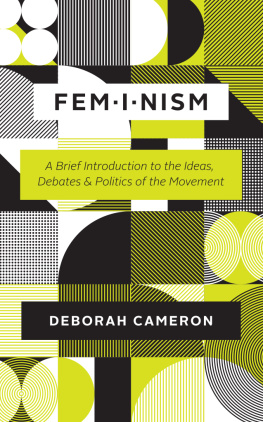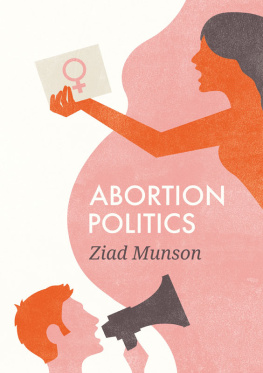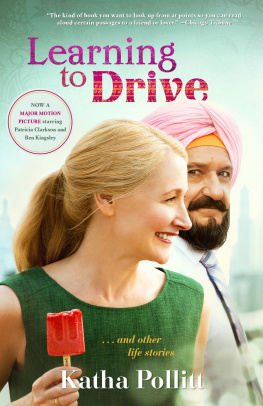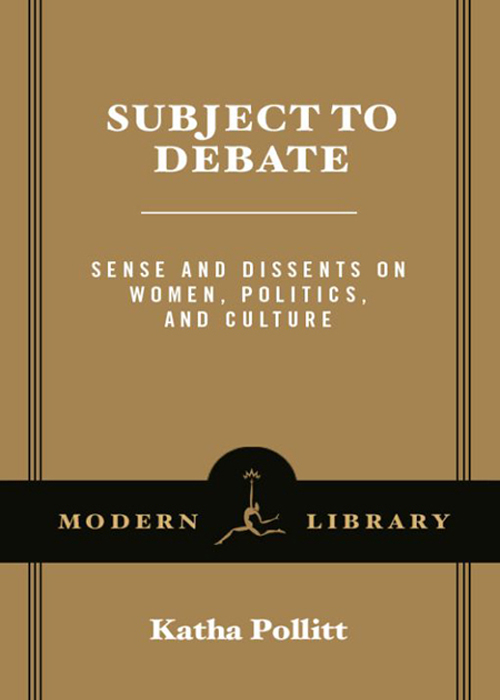
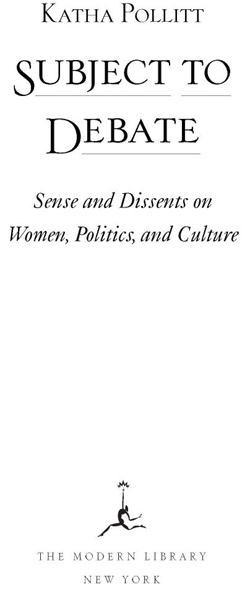
Table of Contents
For Sophie, and for the Last Marxist
ACKNOWLEDGMENTS
For offering me a page of my own with complete editorial freedom, I am deeply grateful to Victor Navasky and Katrina vanden Heuvel, publisher and editor of The Nation. For help with research, copy-editing, and clarification of thought, many thanks to the staff of The Nation, especially my editors Elsa Dixler, JoAnn Wypijewski, and Betsy Reed; copy editors Roane Carey and Judy Long; and interns Maura McDermott, Beverly Gage, Elizabeth Ratner, Sari Nelson, Stephanie Greenwood, Chisun Lee, Emily Gordon, Amanda Hickman, Jane Manners, Beth Johnson, Kytja Weir, Anaga Dalal, Amy Cash, Erin Smith, and Dan Honan. Ann Snitow, Barbara Ehrenreich, Frances Fox Piven, Doug Henwood, Ellen DuBois, Adolph Reed, Joan Bertin, Laura Flanders, Alan Wallach, Janine Jackson, and Donna Lieberman offered sources, ideas, facts, quotations, and controversies. Josh Freeman did not complain when I quoted him without asking first. As always, my deepest debt is to Paul Mattick, who challenged, discussed, encouraged, read, and reread till all hours of the nighteven when, as sometimes happened, he thought my ideas were definitely subject to debate.
INTRODUCTION
FEMINISM AT THE MILLENNIUM
Its the year 2000. Are we equal yet? Are we dead yet? Have the frontlash and the backlash met, grappled, and twisted themselves together like a pair of mating snakes? More than one hundred and fifty years after the Seneca Falls Convention, when American women first met to demand full legal, political, and social equality, including the right to vote, the position of women continues to provoke furious argument. For every gain hard fought for by women, someone manages to find a negative side. Speak of the recently won legal freedom of women to control the timing and number of their children through contraception and abortiona right not yet thirty years old, and one that for many exists only on paperand conservatives from Francis Fukuyama on down chorus that this has only licensed men to be sexually irresponsible, leaving women more vulnerable than before. Note the dramatic increase in women going to college and moving on to higher degrees and careers in the professions, and youll get an earful from faux stay-at-home mom Danielle Crittenden about lonely lawyers whove missed their chance at marriage and family. (Interestingly, it isnt the lonely lawyers themselves who make this complaint, but the professional anti-feminist to whom, in a weak moment, they have supposedly confided.) Note the increased influence of women in politics, and New York Times columnist Maureen Dowd responds with a jeremiad against soccer moms and the trivialization of once grand political themeshonor! greatness! patriotism!while male conservatives bemoan the feminization of America.
Some of the same ambivalence marks even the attempt to evaluate how powerful women are. On the one hand, we read constantly that women arent interested in feminism, that it doesnt work, cant work, even our genes are against it: Men are programmed to dominate and spread seed widely among the young and fertile, women to nest and preen and cuddle up to wealth and power. On the other hand, some of the same evolutionary psychologists who argue that male dominance is in the genes see men on the defensive everywhere, with women poised to run the universe, in fact running large tracts of it already: Feminists have rewritten the age-old contract between the sexesshe gives sex in return for supportand in the process have revamped law, politics, religion, education, and the literary canon. Why women have been able to fly in the face of nature is never explained, much less why they would even have the desire to do so or, most mysterious of all, why men have cooperated with this mad plan. After all, men are still firmly in charge of all the institutions accused of excessive kowtowing to feministsthe courts, the legislatures, the corporations, the schools and universities and publishing houses and seminaries. Why have men allowed their privileges to be curtailed? We are constantly told that women themselves have little interest in feminism: Pretty young girls dont need it; working-class and minority women scorn it; young professionals think theyve got it already. An article in Talk magazine about Lorna Wendtthe homemaker and corporate helpmeet who made headlines when she demanded an equal share of her CEO husbands assets when he divorced her after more than thirty years of marriagerefers to the audience at one public appearance of hers as an old-fashioned feminist one, women in cork-soled shoes, their bosoms ample rather than augmented, staid members of the American Association of University Women and the League of Women Voters. But if feminism is so outmoded, and feminists so uncool and frumpish (imagine, no breast implants), it becomes even harder to understand where the continuing power of feminism to alter fundamental social arrangements comes from.
One answer to the conundrum is that feminism has much more of a following than is usually acknowledged. Its true that recent polls assert that only about a quarter of American women describe themselves as feminists, down from about a third in 1992. Yet the same polls show large majorities of American women sympathize with the womens movement and feel it has improved their lives. For all that feminist positions are often described as radical and out of sync with the mainstream, the large majority of women tell pollsters they want legal, economic, and social equality with men, and do not believe they have it yet. Many radical feminist causes, when fleshed out with particular cases and close arguments, have broad appeal to both sexes. Americans regularly tell pollsters they abhor partial-birth abortion. But when they were made to vote on its legality in state referenda in Colorado, Maine, and Washington, and in the process had to think concretely about the wording of the law and what criminalization would really mean, they chose to keep it legal three times out of three. Or consider Davis v. MonroeCounty Board of Education, the much publicized Georgia case in which the Supreme Court was asked to decide whether public schools receiving federal funds were legally liable for student-to-student sexual harassment. Anti-feminist pundits spilled oceans of ink belittling the issue, denying the need for some sort of school response (in the Davis case, teachers had even refused so simple a gesture as changing the victims seat in her fifth-grade class so she wouldnt have to sit next to the harasser) and criticizing the girls mother for not having solved the problem on her own. You would never know from their accounts that the boy in question was convicted of sexual battery for the behavior they found so trivial (or that the victim was black and the harasser white). Still, the Courts 5 to 4 decisionwhich held public schools responsible for stopping harassment, but only when the harassment was severe, pervasive, and objectively offensive, and only when school authorities could be shown to be deliberately indifferent to itdrew favorable responses in polls (and sighs of relief from school administrators, who had feared a judgment that would have held them responsible for knowing about harassment, reported or not). Almost a year later, the case hardly seems controversialespecially in the wake of the Columbine killings, which made many adults question whether schools were doing enough to counteract a general student culture of cruelty and hostility, and were too oblivious of antisocial behavior and troubled kids. Whether or not individual moms and dads think of themselves as feminist, demanding fairness and equality and respect for their daughters is increasingly a part of what it means to be a good parent today.
Next page


